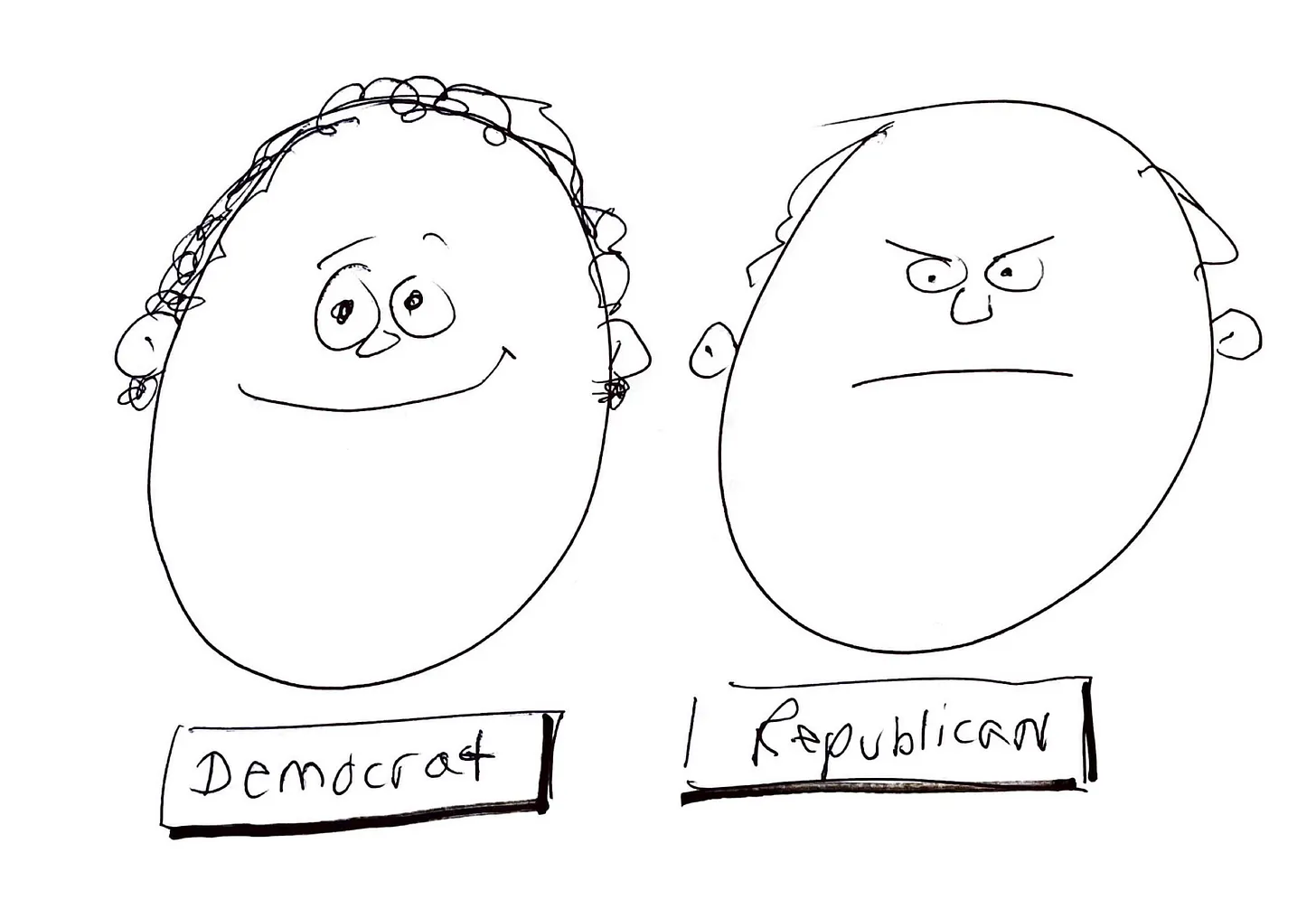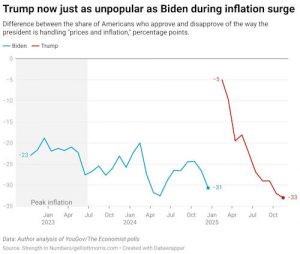- Robert Reich on undisciplined Democrats and regimented Republicans;
- Squaring that with Mike Johnson’s comments a year and a half ago;
- Paul Krugman on how Trump successively lies, over and over;
- How Trump doesn’t understand mortgages or health insurance;
- Wikipedia, Jimmy Wales, and the right-wing attacks on consensus truth.
More catching up, with some longer pieces worth quoting from.

Robert Reich, 12 Nov 2025: Why are Democrats so undisciplined and Republicans so regimented?, subtitled “The asymmetry explained”
Chuck Schumer couldn’t hold his senators together at a time when their unity and toughness were essential. Yet Trump cracks the whip and gets all Republicans to do his bidding.
Does this mean Schumer should go? Yes.
But the problem runs deeper — to a fundamental asymmetry at the heart of American politics: Democrats are undisciplined. Republicans are regimented.
For as long as I remember, Democrats have danced to their own separate music while Republicans march to a single drummer.
With examples about Bill Clinton and others…
There’s a psychological-structural difference between the two parties.
Democrats pride themselves on having a “big tent” holding all sorts of conflicting views. Republicans pride themselves on having strong leaders.
People who run for office as Democrats are, as a rule, more tolerant of dissent than are people who run for office as Republicans. Modern-day Democrats believe in diversity, E Pluribus. Republicans believe in unity, Unum.
Research by the linguist George Lakoff has shown that in our collective subconscious, Democrats reflect the nurturing mother: accepting, embracing, empathic. Republicans represent the strict father: controlling, disciplining, limiting.
And this:
As America has grown ever more unequal and contentious, people who identify as Democrats tend to place a high value on the tenets of democracy: equal political rights, equal opportunity, and rule of law. That’s a good thing.
People who identify as Trump Republicans tend to place a high value on the tenets of authoritarianism: order, control, and patriarchy. (In fact, Trump authoritarianism is the logical endpoint of modern Republicanism.)
A majority of the current Supreme Court, comprised of Republican appointees, is coming down on the side of order, control, and patriarchy — which they justify under the legal fiction of a “unified executive” — rather than equal political rights, equal opportunity, and the rule of law.
This is all familiar stuff. But wait — what about that piece from a few months ago, where Speaking Mike Johnson admitted that Republicans were individualists who can’t cooperate to get things done? Actually, it was from April 2024.
Johnson claimed that “Democrats Are ‘Collectivists And Socialists’ But Republicans Are ‘Principled Rugged Individualists'”. My response: nonsense. That item and today’s item are talking at cross purposes. To some extent Johnson was simply wrong; to the extent he had a point, he’s denying the authoritarian streak among conservatives by calling them “individualists.”
\\\
Republicans are not individualists because they’ve all fallen into place to support their authoritarian leader. To the extent of believing things that are simply not true.
Paul Krugman, 12 Nov 2025: War Is Peace. Freedom Is Slavery. Grocery Prices Are Way Down., subtitled “Lying has worked for Trump in the past. Is this a lie too far?”
It is true that Biden officials liked to cite statistics that presented a favorable picture of the economy, but they were genuine statistics and did indeed seem to show an economy in pretty good shape.
Trump, by contrast, is engaged in what CNN calls a “lying spree” about inflation. We all know that many media organizations have long had a habit of “sanewashing” Trump, downplaying the craziness of his remarks. What we’re seeing now is “truthwashing,” pretending that there is some factual justification for bald-faced lies.
Let’s talk for a minute about what happened under Biden, then turn to Trump’s pants-on-fire claims about prices.
It goes on, with more charts. Krugman ends:
As that left-wing rag the Wall Street Journal points out, the only people who seem to be feeling good about the economy right now are those who own a lot of stock.
But I believe that the turn against Trump is also in large part a backlash against his attempts to gaslight the public about the true state of the economy. Once again, these attempts aren’t about putting a positive spin on the data. They’re just flat-out lies.
And Democrats should hammer those lies as proof not just that Trump is utterly dishonest, but that he’s completely out of touch with the reality of American life.
(He’s being sarcastic about the Wall Street Journal being a left-wing rag.)
\\\
Trump doesn’t understand so many things.

The New Republic, 11 Nov 2025: Fox Host Corrects Trump on How Mortgages Work as He Touts 50-Year Plan, subtitled “Donald Trump doesn’t seem to understand what the average mortgage looks like for Americans.”
President Donald Trump is so deeply out of touch on what life is like for everyday Americans that even Fox News host Laura Ingraham had no choice but to correct him on her show Monday.
Trump, who over the weekend debuted a widely derided 50-year mortgage plan on Truth Social (where he compared himself to FDR), sat with Ingraham to clear things up.
“Your housing director has proposed something that has enraged your MAGA friends, which is this 50-year mortgage idea,” said Ingraham. “So—significant MAGA backlash, calling it a giveaway to the banks, and simply prolonging the time it would take for Americans to own a home outright. Is that really a good idea?”
Trump, in classic form, dismissed her concerns: “It’s not even a big deal. I mean, you go from 40 to 50 years—”
Ingraham corrected him: “Thirty to 50.”
Trump is the guy who thinks “groceries” is some exotic, old-fashioned term. (He’s never shopped for groceries in his entire life.)
\
Fact-checking.

PolitiFact, 11 Nov 2025: Can Trump create $2,000 tariff dividends, 50-year mortgages or direct health care payments?
These are unlikely to pass, and this piece looks at the implausibilities of the three proposals. (Essentially, this is another item about how many people don’t actually understand how the world works.)
\\\
First of all, Wikipedia founder Jimmy Wales appeared on KQED’s Forum show a couple weeks ago.

KQED Forum, Mina Kim, 31 Oct 2025: Wikipedia Founder Jimmy Wales on How to Build Trust
Wikipedia, the crowdsourced encyclopedia, is one of the world’s most visited websites, with 11 billion page views each month. Its founder, Jimmy Wales, credits its success to one thing — trust — which he sees at odds with our increasing loss of faith in institutions and in each other. In his new book, he lays out what he calls a “blueprint for building things that last” in volatile times.
It’s all about trust, and self-checking.
So when we think about the trust that readers have in Wikipedia, there’s a few elements that are really, really important. First of all, the transparency of showing sources. You know, whatever we say, we should link to a source, and the source should be high quality — you know, respected magazines, newspapers, academic journals, that sort of thing. So that really helps a lot, because you can check the information — where it came from. Another really important element is neutrality — the idea that Wikipedia shouldn’t take a side on any controversial topic. And, you know, to the extent we live up to that, I think it helps to build trust because people say, “Okay, they’re not here to convince me one way or the other; they’re just here to explain the debate to me.” And I think that’s really, really important and something that we need to continue to improve and to focus on.
(Because it’s human nature to trust others — tit for tat — until they betray you. Then you change your strategy.)
A really good interview. Wikipedia is about honest, intelligent people, who are trying to find a consensus about what is real, and true. (And I think there are more of them in the world than their critics.)
\
On the other hand, there’s this.

The Atlantic, Renée DiResta, 11 Nov 2025: The Right-Wing Attack on Wikipedia, subtitled “The free internet encyclopedia is widely used to train AI. That’s why conservatives are trying to dethrone it.”
Late last month, Elon Musk launched Grokipedia, an AI-generated encyclopedia with 855,279 articles, no human editors, and no way for users to request improvements beyond a suggestion box addressed to its eponymous chatbot author. The tech entrepreneur is eager, he has said, to “purge out the propaganda” that he argues afflicts Wikipedia, the venerable user-generated reference source. But some Grokipedia articles are near replicas of Wikipedia entries. Other articles in the new source seem conspicuously sanitized: The article about the U.S. government’s now-defunct foreign-aid agency fails to mention Musk, who boasted about his role in “feeding USAID into the wood chipper.”
The article doesn’t mention Conservapedia (this is a Wikipedia link; I’m not going to link to it).
Another of Wikipedia’s guiding principles is “assume good faith”—which its prominent critics are not doing. Musk and others have taken to calling it “Wokipedia.” Sanger, who has become an outspoken critic, argues that Wikipedia has adopted what he calls a “GASP” worldview — globalist, academic, secular, progressive.
Well, because that’s reality. In an inescapably globalist society, there is no going back to religious tribalism, as conservative evangelical Republicans would like.






